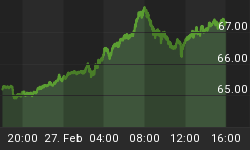Below is an extract from a commentary originally posted at www.speculative-investor.com on 10th May 2007.
In recent commentaries we've devoted a much larger-than-usual amount of space to the Yen. The reason is that the performance of the Yen and the related Yen carry trade are such important pieces of the current market puzzle.
A sharp rally in the Yen that is either caused by the unwinding of the Yen carry trade or leads to an exodus from the Yen carry trade would throw the proverbial spanner into the works. Markets that have been floating upward on a veritable sea of liquidity would suddenly find that there was no longer anything to keep them afloat. This is because the viability of the most important financing mechanism used by large speculators is totally dependent upon the Yen remaining in a downward trend relative to both the euro and the US$.
But with Japan's monetary authorities seemingly intent on keeping the price of Yen-denominated credit several percentage points below the price of credit in terms of almost every other currency, why on earth will the current trend come to an end in the foreseeable future?
We can hazard guesses. For example, it is possible that rising inflation fears combined with the realisation that the Fed's next move is more likely to be a rate hike than a rate cut will set the ball rolling by causing a sharp sell-off in equities, prompting large traders to exit their equity long positions and the associated Yen-based financing arrangements. The truth is, however, that we can't confidently predict why the trend will end. What we do know is that once almost everyone becomes convinced that a trend is destined to continue forever, the trend is close to an end. When such trends end it is often difficult -- if not impossible -- to identify one specific catalyst, even with the benefit of hindsight, but end they always do.
There could be a final blow-off in the Yen carry trade over the next few weeks or even months, so we don't think it makes sense to do anything drastic in anticipation of an imminent end to the trade. We will, however, continue to pay close attention to the Yen's performance relative to both the US$ and the euro. For example and with reference to the following chart, it wouldn't take much strength from here in the June Yen futures contract to effect an upside breakout, which would, in turn, be an early warning signal of a trend reversal. But it also wouldn't take much additional weakness from here to break the Yen downward through support and usher-in the prospect of a blow-off move.

As far as how the various markets would react to a major unwinding of the Yen carry trade, the action during late February and early March might have been a preview. The happenings of the final week of February and the first week of March suggest that a major unwinding of the Yen carry trade would:
a) Cause sharp downturns in equities throughout the world, with emerging market equities, financial stocks and commodity-related stocks taking some of the biggest hits.
b) Cause a dramatic widening of credit spreads due to an increase in the demand for high-quality debt (US Treasury bonds) and a concurrent plunge in the demand for lower-quality debt (junk bonds, emerging market bonds).
c) At least initially, cause the prices of gold and gold shares to fall sharply. In our opinion, gold would be taken down amidst a wave of de-leveraging and would then recover in response to the widening credit spreads.















